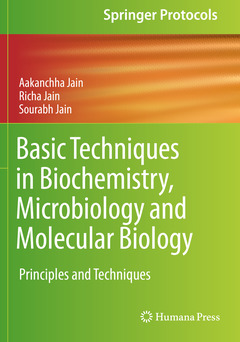Basic Techniques in Biochemistry, Microbiology and Molecular Biology, 1st ed. 2020 Principles and Techniques Springer Protocols Handbooks Series
Auteurs : Jain Aakanchha, Jain Richa, Jain Sourabh

This book presents key methodologies, tools and databases for biochemistry, microbiology and molecular biology in simple and straightforward language. Covering all aspects related to experimental principles and procedures, the protocols included here are brief and clearly defined, and include essential precautions to be taken while conducting experiments. The book is divided into two major sections: one on constructing, working with, and standard operating procedures for laboratory instruments; and one on practical procedures used in molecular biology, microbiology and biochemical analysis experiments, which are described in full.
Each chapter describes both the basic theory and relevant practical details for a given experiment, and helps readers recognize both the experiment?s potential and limitations. Intended as an intensive introduction to the various tools used in molecular biology, the book covers all basic methods and equipment, including cloning, PCR, spectrophotometers, ELISA readers, sonicators, etc. As such, it offers a valuable asset for final year undergraduate (especially project) students, graduate research students, research scientists and technicians who wish to understand and employ new techniques in the field of biotechnology.Describes experimental protocols in a simplified manner
Covers all relevant practical details for a given experiment
Introduces various tools used in molecular biology
Date de parution : 08-2021
Ouvrage de 282 p.
17.8x25.4 cm
Date de parution : 02-2020
Ouvrage de 282 p.
17.8x25.4 cm
Thèmes de Basic Techniques in Biochemistry, Microbiology and... :
Mots-clés :
Microorganisms; Extremophiles; Oxidative fermentation; Thermophiles; Psychrophiles
Ces ouvrages sont susceptibles de vous intéresser

Molecular Food Microbiology 208,65 €


